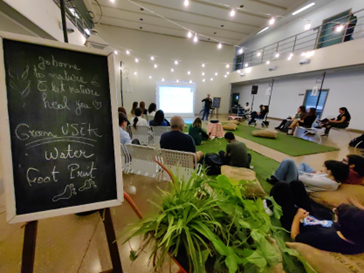At the Holy Spirit University of Kaslik – USEK, a commitment to sustainability and the empowerment of students as eco-citizens is a guiding principle. Through projects aligned with the United Nations Sustainable Development Goals (UN-SDGs), USEK is pioneering a sustainability algorithm known as "Youth_Abilty." This program offers students the opportunity to participate in projects with tangible outcomes, all while staying on campus. These projects are student-led and encompass waste management, awareness, and creativity, with the overarching goal of grooming the next generation of eco-citizen leaders.
Green USEK plays a pivotal role in inspiring students to drive green initiatives. This synergy equips students with the knowledge and skills needed to become the future leaders of eco- citizenry.
Student-Led Initiatives, encompass a diverse range of sustainable practices, including Awareness, Earth Day event, Seedballs, Animal Welfare, GAEA (An initiative focused on upcycling waste by adding artistic value to discarded items), Recycling, Book Exchange, Clean-ups, Bring Your Bucket to campus (this initiative invites staff, faculty, and students to bring their organic food waste to campus. In return, they receive fresh organic eggs or compost), Carpool, I Hear You (A unique initiative aiming to maximize waste sorting at the source by encouraging communities to deposit their plastic bottles in designated bins. In return, Green USEK provides hearing aids to children with hearing disabilities at The Blind and Deaf School in Baabda, Lebanon).
And Agora: This initiative focuses on shedding light on key sustainability issues in the public spaces of the campus.
The term “agora" finds its roots in ancient Greek city-states, signifying a central public space that served as the epicenter for multifaceted aspects of life, including athletics, arts, commerce, social interaction, spirituality, and politics. In essence, it was the quintessential "gathering place" or "assembly" for a city-state. This concept serves as the foundation for the USEK initiative, providing a relevant and meaningful platform for students from various majors, particularly those enrolled in communication-focused courses, to practice public speaking in front of an audience. More importantly, it challenges them to apply their acquired knowledge while addressing critical sustainability issues.
Among many topics discussed and treated, one of the key topics explored within this initiative was the "Water Footprint Concept."
This concept delves into the total amount of water used directly and indirectly in the production of goods and services, encompassing the volume of water consumed or polluted during the production process. It accounts for both on-site water usage (referred to as "blue water") and the water used to produce inputs from external sources (termed "green water" and "grey water," respectively). Water footprint analysis offers insights for individuals, companies, and governments to comprehend their water usage and identify opportunities to reduce their water footprint.
The debatable question was: Should consumers Be More Aware of the Virtual water Footprint of products they purchase and assume Responsibility for Reducing their virtual water Footprint?
And it was led by Mr. Georges Gharios holds a PhD in Water Law from the University of Dundee in Scotland, UK. Mr. Gharios is a Water Policy and Governance Specialist at Difaf s.a.l., focusing on ancient water laws, traditional knowledge, legal pluralism, and social water arrangements. He possesses expertise in international land and water management, integrated water resources management, water reform, and water users' associations. His work extends to international organizations, including the FAO, UNDP, UNESCWA, USAID, Geneva Water Hub, among others. With multiple published articles and conference contributions in the realm of water laws and governance, Mr. Georges brought a wealth of knowledge and expertise to enrich the debate on the water footprint concept.
Agora initiative is not only a platform for intellectual discourse but also a vehicle to elevate students' awareness of sustainability matters, offering a space for connection with like-minded peers and the acquisition of effective means to contribute to a better future for all. Through the Agora, USEK stands at the forefront of empowering the next generation of eco-citizens and environmental advocates.

